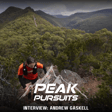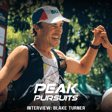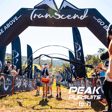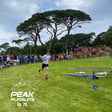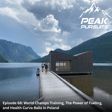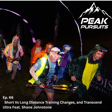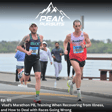Introduction and Weather Chat
00:00:07
Speaker
Hello, welcome to episode 59 of the Peak Pursuits podcast. My name is Simone Brick and I am coming to you from home in Melbourne, joined by two other East Coasters-ish, if you can call where you guys are both East Coast, but it's the East side of the country.
00:00:25
Speaker
Jess Jason up in Canberra. how are we doing, Jess? Yeah, good, thanks. Pretty cold um up here and wet, but staying dry and happy. Is this going to be your first Canberra winter?
00:00:37
Speaker
Yeah. ah Sorry, I'm bracing myself. Yeah. Okay. we're We're getting like a weird warm start to winter down here in Melbourne. So it's been lovely. But I'm also joined by James Sieber up in Albury.
00:00:51
Speaker
Yeah, Aubrey. Everyone should be very proud of me calling it Aubrey just then because I cop a lot of crap for calling it Albury because I'm a boy in there.
00:01:02
Speaker
Yeah, i can't car I can't say anyone around here calls it that. i think it's definitely Aubrey. Yes, well, it never makes sense. It's Albany but Aubrey. So, anyways, that's WA things for you. Yeah. Anyways, how are we doing, James?
Podcasting Hecticness and UTA Recap
00:01:20
Speaker
Yeah, I'm very well, thank you. Just enjoying, ah feel like we're halfway, well, we are geographically halfway, but also in weather as well. We're starting to get cold and wet, but it's also quite warm and it's been very dry, so the rain has been quite nice.
00:01:34
Speaker
And outside of weather, doing pretty well. Starting my return to run, which is ah very nice feeling. Yeah, um we're going to hear all about that because James is on the main pod because he's getting to see the back end of what we do and it's absolute mayhem.
00:01:50
Speaker
um especially after UTA. So this episode may end up a little shorter, but I might say that and then regret it in an hour. um But also we've been pumping out a lot of UTA recap episodes. So if you haven't listened, they're all pretty much timeless.
00:02:07
Speaker
So go back and listen whenever it suits you. But they've been a lot of fun to get out this week. It just feels like it's been a bit of podcasting mayhem on the back end. feel like that whole sometimes, you know, the duck with the with the really quick legs under the water, but you're floating nice and gracefully. Yep.
00:02:23
Speaker
Yep. Might look all right. Exactly.
Jess's Post-50k Recovery and Reflections
00:02:25
Speaker
Exactly. ah exactly Anyways, to get us started though, we'll stay on the UTA vibes because Jess, I'd love to hear how you've been feeling after the 50k.
00:02:37
Speaker
um Yeah, really good actually. My body's been feeling really good. um I pretty much had week off running, um which was nice. I usually do that anyway. um i just like to make sure that I'm resetting and like I'm kind of ready for a break um after these big races so just nice to like have more time to like spend on other things like just catching up with work and like admin and stuff. um So I just did a few dog walks, some yoga.
00:03:13
Speaker
just kept it pretty chill, did a couple of saunas, I've cranked up my tent sauna again, I've got that going. When you say tent sauna, like one of those fabric ones or is it a proper one?
00:03:26
Speaker
It's um like a proper one that I brought ah bought from a brand, but ah it's more of like a mini steam room in a tent than like a sauna. Cool. So I think it's safe. It gets the body temp up. It does the job, yep. Yeah, yeah does it does it feel like it actually gets you hot and work like working? Yeah.
00:03:47
Speaker
Yeah, it's just um you have to stand up um to make it feel hard because like the steam, the hot steam like goes up towards like the top of the tent and then the bottom is kind of like still pretty cold from the cold floor.
00:04:00
Speaker
yeah um So that's the only annoying thing. You kind of have to stand for like 20 minutes or however long you want to do it for. Yeah, fair. It's a little less comfortable. It does the job. listening to the the runners that are doing 12 hour weeks complaining about standing up for 20 minutes it feels pretty standard I know I don't know how I used to work in retail like yeah ah Yep, counted as extra time on feet training. That's perfect. um And over the last week or over the while you've been recovering, how has the feelings of the race evolved? Like any any other things you've been reflecting on or takeaways from the race?
00:04:38
Speaker
um Yeah, to be honest, I was – pretty I was feeling pretty sad the first couple of days after um yeah I don't really know why i think I just had a lot of anxiety and adrenaline in the lead up and then it just kind of crashed um and then yeah don't know just like I needed to really like distance myself from it and kind of like just didn't tried not to go on social media for a bit and just like, um yeah, I don't know, you just like switched off from the from all the race and like the recaps and stuff. um
00:05:14
Speaker
But, yeah, since then I think feeling a lot better um on reflection, i think like just – having like the positive second half of the race um and like how i was able to turn it around just like drawing from like the strengths that I showed and like the positive um sort of outcomes that I found from the race has made me feel a lot better um and just like keeping in mind that like I'm still pretty new to this sport like
00:05:46
Speaker
so your first 50 yeah let's try you're a complete rookie yeah so definitely like let my expectations get to the better of me um again but still learning and i think it's getting better so yeah yeah i did find it very interesting when you said jess at the uh uta podcast that this was your first 50 that i just completely forgotten about that i think because we've Obviously heard about you now a lot with the podcast and your name keeps coming up with results. In my head, you just done it and therefore would have the question mark about running a 50 for the first time. That wasn't in my head, especially like when doing the preview of it. And that has a lot of weight and a lot of challenge in itself.
00:06:30
Speaker
So to me, it just increased how impressed I was with your run, especially the way that you did really rally in the second half and came
Racing Expectations and Learning Curves
00:06:40
Speaker
through. Yeah, I guess I was just a bit like, I think the sadness was coming from like how far I was from like the podium.
00:06:47
Speaker
Like I probably like wanted to be a bit closer, but yeah, I don't know I think I'll get there. I just need to work through a few things and Sometimes it feels like our brains ah our worst enemy in this case because I try, ah like this is just something I've tried to do over the years, which some people will look on and go like the competitive side of your brain might not like because the competitive side of my brain didn't like it to begin with either.
00:07:13
Speaker
But I found I had to step into this mindset where when I, especially when I started going overseas and competing in these massive events and I'm rocking up as a complete rookie.
00:07:24
Speaker
And part of my brain is going, hell yeah, we can do this. We're going to be amazing. But if I let my brain go too far down that avenue, I knew that there's a trap on the other side of that where,
00:07:36
Speaker
In reality, you're a rookie coming in to do this for the first time against people who have sometimes been doing this for years. Sometimes just they've had that bit more experience in what what you're trying to do. And you and then I have a this step back where I go, hang on, who am I to say I can do something for the first time?
00:07:56
Speaker
better than other people have been doing it for years. Like I go, am I really that up myself that I think I can? Like that's almost what I say to myself where I'm like, come on, I'm a rookie.
00:08:07
Speaker
And then so I turn it back and I go, let yourself be rookie. Let yourself be a beginner and go, There is actually like there is an expectation that the competitive half of my brain has. I kind of let that sit there.
00:08:20
Speaker
And then if you have a good day, it comes out and you go get it and it's fine. But that's so almost never going to happen as I've learned. Sometimes it does. And you relish those days. But other times I go okay, what's the experience I can get out of this? Or what's the thing that I got out of today that's going to make me in four years' time similar to that person that's been doing this for the last four to eight years or however many it's been?
00:08:46
Speaker
um Like at the end of the day, you're you you can only work with what you've done in the past and the experiences you've got. You had no experience what you were doing. It's like someone coming in as a complete beginner And our brains will latch on and go, yeah, I can beat you.
00:09:01
Speaker
But then if you flip it around, you go, hang on, why do you think you can beat someone that's been doing it for so much longer than you? And I do love, as I said, there is this...
00:09:11
Speaker
There's this conundrum where I do love the confidence of having a crack at that because you do never know. You could go and do that thing and be amazing and you have a great day and you relish that.
00:09:22
Speaker
But there's just the times where I saw in you the day after what I have felt so many times where you've gone in and I made this mistake on my very first overseas race at Marathon de Mont Blanc. I had such big expectations for myself.
00:09:38
Speaker
And then at the end of the day, I had a decent run. But the next day, it was all doom and gloom going. But it was so much worse than I thought I was going to be. And you can't then, it's really hard to take the positives until someone makes you step back and go, hang on.
00:09:54
Speaker
You just tried something for the first time and showed that you've actually got all the potential in the world to go places. Because that's what you did. You came forth in a stacked field in a great time on a rough course on a day that wasn't even perfect.
00:10:08
Speaker
Like there's not much more you can do for a first crack at something. Yeah. I would have learned a lot in that process. I think we all, I know this applies to me, regardless of really where you are in the in the pack, but you come in with these, whether it's ego or it's been lack of lack of humility or these expectations that you've done all the work and therefore you deserve the day that you dream about.
00:10:30
Speaker
Yeah. Whether that is the competitive element or just it all going smoothly, but how many times, even if you have a great race, everything actually goes smoothly. It's a mission of problem solving and then learning those lessons and taking them forward, which that's why we do them.
00:10:45
Speaker
That's why you get better. Yeah. yeah The hard days teach us a lot more. They do, but also I think the people that they' survive in the sport or any sport the longest are the ones that are just very quick to forget the bad days.
00:10:59
Speaker
very quick to remember the good days. And then also I think one thing I suggested to you straight after the race, Jess, when it comes to these race nerves and those sorts of things is that that's why I jump in so many training races because you put yourself in this race environment, you put a bib on you stand on a start line and like um when we get to my week I'll explain but like I just did a cross-country race and I'm so calm and happy on that start line because I know it means jacked.
00:11:28
Speaker
Like I'm there to have a good time and I go, if I'm not smiling this whole time, I'm doing it wrong. And then my brain starts to associate standing on a start line with a bib as being calm and happy.
00:11:40
Speaker
And the more I do that, the more I then just get used to the start environment, the countdown, the people around, the pack starts and those sorts of things in a much more calm environment.
00:11:51
Speaker
And I think you were doing a great job of that last year with the Perth Trail Series. with jumping in all the start lines and getting that sort of training experience within a race um that then makes the big start lines a little easier to handle, I find at least.
00:12:06
Speaker
um So, yeah, that might be something you can do in the lead up to the next big race to stop that massive crescendo um anxiety, anxiety, anxiety in the lead up to the race. And then no matter who you are, and I think almost no matter how well the race goes, once you've built up that much pent-up energy,
00:12:24
Speaker
your but body needs to release it all and it's going to do it by just breaking down.
James's Injury Journey and Training Adaptations
00:12:30
Speaker
Like everyone does. It's so normal. Like done it, been there done so many times where like someone just goes, how are you? And you go, i'm actually really good, but I'm about to cry again.
00:12:44
Speaker
Yeah, 100%. I definitely, yeah I'm going to take that on board. um Got some like low-key races that I might do like before Worlds and stuff um up in Sydney. So that'll be good. um yeah, I think just like taking the positives and then going back to like why i'm there today.
00:13:06
Speaker
outside of like the outcome which is just because I love running i love trail running i love like the community and I love being someone that like the younger generation can look up to so um I'm still getting all of that out of my race result so yeah got to be happy with that You could have taken a whole nother hour out there and still gotten all those things. It's like, it's it's cool when when you're able to tap into that on race day.
00:13:35
Speaker
um It's just, for me, it's just the you learning to create the environment where you can. um because, yeah, i live in I live in the anxious body too. It's been many, many, many years of trying to figure out how to hone that.
00:13:51
Speaker
um But I think you're doing amazing. never Never lose sight of that and don't lose sight of the the joy on this on that um of running. So yeah it'll be good. I'm glad you're recovering well, though. We love that. And I also love the fact that you take a whole week off after these things. I wish more of my runners were willing to do that than my coach.
00:14:09
Speaker
Yeah. I've actually like learnt to enjoy it It's just nice. It's like, wow, I actually have so much time yeah and energy. That's the best bit.
00:14:20
Speaker
Exactly. And when it's not forced, we love it. When it's forced, it's the worst thing in the world. Yeah. The good old runner conundrum. But someone that has recently lived that is James.
00:14:33
Speaker
um who James, tell us where you are on your – actually, well, but A little bit of the injury and then where you are on your return to run journey because you're back moving. I am back moving, which I said to you just before we started is both a good and a bad thing because I just want to do more. But yeah, so I've coming back from a grade 4A. It's a pretty high grade femoral shaft stress fracture.
00:14:56
Speaker
I got to got it training for Buffalo, but we still don't really know why. And to be honest, that's part of my like main worry at the moment is yeah we still don't really know Why? My training was pretty consistent. I'm working with sports dietitian. I previously worked with a sports dietitian and pretty confident in the amount of food was getting in for fuel and and but we fine-tuned the ratios and stuff, but it wasn't like I was wildly out and the location is a bit weird. So That's still a bit of ah a concern, but we are 16 weeks, I think now in or so. And I started ah my return to run two weeks ago. So leading into UTA. So it started very, very gradually. The first one was six rounds of one minute run, six minutes walk. So that was...
00:15:44
Speaker
It doesn't really feel like you're running at all, to be honest. It just kind of feels like I'm and i on a walk and then I need to get across the road quickly, but yeah it's picked up pretty quick. ah When we were up at UTA, I sort of ignored that a bit and was running in and out of aid stations with my athletes quite a bit and it feels great.
00:16:02
Speaker
I think my coach, Tim, he said to me that at the moment, if you're all I want is to do more. And he said, that's if you're at this point and you feel like you're pushing it or you're struggling, that's a very bad sign.
00:16:14
Speaker
So I'm in the gym five days a week at the moment on the elliptical, now running three days a week. Today was six rounds of four minutes run, one minute walk, so half an hour.
00:16:26
Speaker
And my average pace, I think, was sort of 5.15. So it's a ah run. It yeah feels like a run. And I'm getting quite accustomed to these walking breaks in my runs. They're quite nice. I'm not...
00:16:37
Speaker
Not saying, oh, I'll keep them in, but it's you you run for a bit. It is really interesting, though. You go from training like at max 12, 13 hours a week. You're always doing long runs. And then then all of a sudden, running for four minutes is really, really daunting as you build up. It's just so curious how the brain works like that.
00:16:55
Speaker
but So like this time next week, I've got to do seven-minute run times six. And that sounds like a really long time to be running continuously for. It's like doing a workout. It's like everything is ah is ah like a speed session at the moment.
00:17:07
Speaker
But it's good. it's it is It is interesting. I found it almost easier to not be running before I was allowed to start the return to run. Now I can start the return to run. i Like I said, I just want to do more. But there's also this fear of re-injury yeah and yeah just this uncertainty of also how long it will take to get back, which will be still a very long time.
00:17:31
Speaker
Yeah. for full fitness I love that phase though, where just things are progressing so quickly that it's both awesome and scary at the same time. Um, where just week on week on week, you're able to progress because there's not actually that many times in running where that happens once you've been doing it for a while.
00:17:48
Speaker
other than a return from injury. and Quick question, when when you were looking into sort of the answers for this um stressy, i I feel you because sometimes, it go when you especially when you get a stressy, you go, what the hell did I do wrong? And you just go searching. And sometimes when they when everyone's telling you, no, you did everything right, you're like, but how do I stop it happening again? Because, yeah, yeah that was that was me, my last go around. But the...
00:18:13
Speaker
um My question is, do you did you get um the one of the first things they did for me that for me was actually really reassuring um was I had my metabolism tested um to check if I was in suppression, um which proved essentially I got so this scientific proof that just because we're all so individual and you never quite know, um i got this scientific proof that no, you haven't been under eating or under fueling.
00:18:39
Speaker
um And that's not a cause of this at all. Yeah, no. And it would have probably been interesting to do that. ah I do have a history of disordered eating and under fueling quite significantly a few years ago. And so that that that is one of the questions that is being spoken about, but it's been two and a half years since I sort of changed all those habits and they expected if there would have been an issue, it wouldn't, it would have happened before now because my training, my training in December was the same pretty much as it was two years ago in terms of volume and intensity. So that is one thing I did get a bone scan and that came back osteopenia.
00:19:20
Speaker
So yeah there is some weakness there. Again, the next thing now is trying to work out what that is, which living in Aubrey is, beautiful but it's a pain in the ass when you need to see a specialist yeah so the the endocrinologist up here was a nine to twelve month wait and so obviously you can do the good thing with someone like an endocrinologist is you can do it via telehealth so I am booked in but even that was a three month wait for Melbourne and my chiro who's taking my treatment is also in Melbourne so I go down
00:19:52
Speaker
ah this Wednesday actually to do some gait analysis and and another assessment. But yeah, there's a lot of, and then there's some stuff with, I was vegan for a long time and there's some iron absorption issues. So there's like all these little things that we just don't know if any one thing was enough or if it's the combination, what's a red herring.
00:20:11
Speaker
I've got quite lazy with my strength work. So there's just all these, there's all these question marks that we're still trying to work out, which like I said, it's quite scary to go I really want to ramp up and i want to get back to it. And once I get physically ticked off, it's is it just going to happen again?
00:20:28
Speaker
So we'll find out. yeah personally not I understand that. And to be fair, it's not necessarily too late of when you do get back up to mileage or similar to what you were doing before you got injured. You can still go get the um metabolic because what you get is you get a resting metabolic rate test.
00:20:44
Speaker
um which is where like you're breathing into, they test your breath for a whole half hour in a capsule sort of thing to get your actual measured metabolic rate. um And at the same time, like in the same session or just before that, um or just after, I suppose they could do it too. For me, it was always just before they do a DEXA scan.
00:21:04
Speaker
And what they do is they take the DEXA scan and they put in all the equations for what, based on your fat-free mass, what should your metabolic rate be? and It's pretty good evidence that the if you're if they test if they do all the calculations from the DEXA and your resting metabolic rate, I'm just going to put random numbers in is 2,000 calories, um and your tested one is 1,800, you're suppressed and you're not eating enough and your metabolism is low.
00:21:32
Speaker
um If it's 2,000 or above, then your metabolism is working fine, um and that's a good sign that you're eating and enough. um And it can be like you could technically do that at any point to just go, hey, am I fueling the work?
00:21:46
Speaker
um Now, I'm not sure a doctor would want you doing DEXA scans too often, but if for your case, like what it what the what it would show now if you were to just go get it now would be useless to you yeah because you're not running and you're not doing the load and all those sorts of
Fueling, Nutrition, and Efficiency in Running
00:22:00
Speaker
So this is the sort of test that you either get done as soon as you're injured to go, hang on, was this a cause? Or... you get it done, like you can get it done in peak mileage or peak or just at when you're training at a level where you're going, is was I doing the right thing or am I currently doing the right thing fuel-wise?
00:22:20
Speaker
um yeah And as someone whose brain also used to very much play tricks on them on the food front, um it's just this piece of paper where you go, no I'm not like, I'm not,
00:22:31
Speaker
in denial of the fact that I eat like a horse and like I am fueling the training kind of thing. Like mine was above what it was meant to be and I've never been so happy. I was like, hell yeah. Yeah. um Still leaves you, if that is the case, with a few unanswered things. However, I will say just from my observation of being in the world of running and eating disorders, I've seen the manifestations of a period of underfueling come to the fore many years later.
00:22:59
Speaker
Like it's it's amazing how long the body can just remember times you didn't necessarily treat it right. um Yeah. So, which is both unfortunate and understandable.
00:23:11
Speaker
Oh, definitely. And it's, it's part of it in the sense that it's all been done. Right. And you just got to sort of weather that, whatever that means going forward. But in, on the bright side, it's been interesting running again. i feel more efficient.
00:23:27
Speaker
I keep saying this to my Cairo and my coach. I'm like, I don't know if this is possible. And I've done a lot of strength work. So it definitely is possible. And like a lot of form development work. But when I'm hitting the ground, I feel like I'm running better.
00:23:40
Speaker
And my calibration of what I think I'm running versus the actual exertion level is a bit out. So my heart rate high for every run, whether I feel like I'm going really easy. But yeah, the the feel of it is encouraging for when I do come back at least.
00:23:56
Speaker
Yeah, nice. Yeah, that is that's that's the best feeling where you go, o this could be good soon. Yeah, it's all those exercises that I've purposefully avoided because i don't like doing them. It's like Copenhagen's and like just anything really in side plank. And yeah, they so actually apparently work.
00:24:15
Speaker
Yeah, who would have thought? Who would thought it? Yep, Ophelia. That was me after six months of hip rehab doing the tiniest movements with my hips imaginable and then returning to running and going, oh my god gosh, my hips are staying still.
00:24:30
Speaker
yeah never knew this was a thing. Also now I've never had hamstring doms until I did that. And it was like, oh, my hamstrings can work. Like coolest feeling ever. It's like the running is new again. So I'm excited for you. That is yeah an exciting feeling.
00:24:43
Speaker
And I think seeing Siobhan's had her hips issues as well with hip dysplasia, that seeing her process and all all of those just frustratingly small and intricate exc exercises that you have to do, and then seeing the work that, what that actually produces.
00:24:58
Speaker
yeah ah going through this process a it makes me realize a bone injury in the grand scheme of things is actually quite quick it's great yeah it's like it it has a it has a plan it kind of has a start and end and if you do the stuff you get better and you get stronger and then you could perform better as well once you are healthy so yeah Yeah, no, it's her definitely not the worst. Like I used to think it was the worst injury until I spent 18 months trying to figure out what was wrong with my hip.
00:25:27
Speaker
And then I went, okay, no, that was easy. That was fine. 10 MRIs later when the MRI people, when the report just says nothing's wrong and I'm going, I can hardly walk. Yeah.
00:25:39
Speaker
And even just listening to Brody's journey back with his Achilles, like, yes, yeah he's trained on it for a while when potentially one could argue, maybe you shouldn't, he's not here to defend himself. so that's good.
00:25:49
Speaker
and the amount of the The amount of time. Yeah. Yeah. No, I, yeah he, he said that to me. So I feel fro fine if I said one on, but the amount of time that it takes to come back from a soft tissue injury like that is just nuts. And there is no, there's no clear protocol.
00:26:05
Speaker
There's, we know how to, strengthen them and to rehab them but whether that takes six weeks or six months there's so many things going into that so i in a way ah obviously don't want to be injured it sucks but i also still count myself lucky that i've got what i've got and it's also a low risk of reoccurrence which is a very nice thing Yeah.
00:26:24
Speaker
Yeah. Yeah. Make a few changes, get strong. You'll be right. We'll be, uh, we'll be here for the journey. It'll be cool. People can follow along, um, how it's all going as we go over the next months, because it is, it's like, it's a long process that in six months time, you'll go, look, things are good guys.
00:26:42
Speaker
Um, and then you kind of forget about it so quickly, or at least my brain always does. Yeah. I've had a lot of injuries from skiing, like really, really bad ones that have taken years to get fixed. So I also know that you get better.
00:26:56
Speaker
yeah I know it takes a while. And I, when I first got injured, Luke Makara, he said that it would be 12 months until I'm back to pre injury fitness levels. Like you'll be training and doing sessions and stuff, but it just set the expectations straight away. And yeah,
00:27:11
Speaker
Because I know that you do come back. And that once you come back, you look back and it goes, it's actually not that bad. It felt like the longest period when you're in it, but it feels short once you're out of it. Yeah, yeah. It's just yeah just a waiting game and doing the right things.
00:27:24
Speaker
Exactly, exactly. And you'll be you'll be back and firing on all cylinders soon enough. It will happen. exactly um which Which is actually funny because um ah my training week this week, I've almost been reflecting on just the fact that I spent so long it feels like feeling very unfit and then it's only now when I've been running consistently for like probably almost a year now actually.
Simone's Training Reflections and Strategies
00:27:52
Speaker
I probably restarted back running late May last year or in May um and it's only now I've been running for a year again finally after like four rebuilds in a row that it was unlike my body feels resilient and fit and strong and just like it can keep doing things and to be fair i this week coming off of UTA I was so tired that night of no sleep and crewing and then travel home and everything I was destroyed
00:28:23
Speaker
And every single day I would wake up and I'm like, okay, something else aches. hum And to be fair, part of me was doing that whole questioning thing of, okay, what what is actually best?
00:28:35
Speaker
Because sometimes I feel better if I keep runs shorter and keep some strides and keep some efforts in yeah and just don't do long stuff. and sometimes I feel better if I go, screw it, I'm going out for four hours and just going to go super easy and then I'll be fine.
00:28:51
Speaker
And in the end, looking back on my week, it was only yesterday I looked back on my week and I'm like, I kind of maybe stupidly, but also it felt fine, felt okay in the end, went halfway between the two.
00:29:02
Speaker
yeah Because I still like I went for a jog with Brody on the Saturday afternoon at UTA and And that was off the back of zero sleep. And I can remember running along on that jog and Brody starts running and I'm just there like, nah, nah, I can't. Like we were moving so slow.
00:29:19
Speaker
um But then so I decided not to run again until Tuesday. But then the first run I did on Tuesday was a session and I was mid-session going.
00:29:30
Speaker
It was one of those sessions though that I actually find a confidence boost because my paces were fine and my effort was fine, but my legs were screaming at me. Like that whole, we don't want to do this, but we will, but we can kind of thing. um Because, yeah, I still did, I think it was three by six minutes, one by four minute, and then four by one minute hills, four by 30 second hills, which,
00:29:53
Speaker
In my mind at the time was so fine, but was maybe a little much um for how fatigued I was just based on the next few days because I was reduced to not much um for the next few days because i went out for a semi-long run, which turned out to be in the end kind of. Pretty long.
00:30:15
Speaker
like a long run yeah on Wednesday, um, an hour 42, but that hour 42 loop would normally take me like an hour 20. So I'd like backed off the pace so much that it was like, Oh, I'm tired now. I'm just going to walk this flat section.
00:30:34
Speaker
Um, and, Which I'm not sure i I can, for me, it feels like I recover well just by being out in nature and moving and doing the things. So like it looks like a much longer run than it felt like, if that makes sense, because it was just. The twenty first of May.
00:30:51
Speaker
20, oh, the 21st, that was with Katinka. That one I actually, no, sorry, I forget that I did these runs. 21st of May, I did two hours 15. That one I was meant to do two hours and that one we actually didn't go that slow.
00:31:04
Speaker
um that was because yeah It didn't look like it was hanging around. We weren't hanging around too much. That's what happens when I run with Katinka. But sometimes. um That one I still felt good. So I did the session. Then I did that long. And then it was the Thursday um that if you look, I did 16K and it was slow. lie Absolutely wrecked. Yeah, that's exactly what I called it, absolutely wrecked. i It was like I woke up that morning and my body went, okay, we're putting all stops on here. Yeah.
00:31:34
Speaker
And to be fair, had I actually gone out for that 16K run and I have my 10-minute rule of going, am I feeling better or worse after these 10 minutes? um And I felt better. I just had to move slow.
00:31:47
Speaker
So there was – and my have even though I was moving really slow, I feel like my heart rate didn't actually wasn't actually that low. Like it was 130 average, um but I feel like I was moving at a pace I could normally hold 120 average kind of thing. So – um Yeah, it was definitely, I slept 12 hours that night too.
00:32:09
Speaker
And that was another sign where I was like, okay, we kind of done. And normally I was meant to do another long, sorry, hour in the morning and like 45 in the afternoon on Friday.
00:32:21
Speaker
um And I just messaged Tim, my coach, after straight after that Thursday run and went, there's no way that's happening. Tomorrow I'll do one, maybe two 30-minute jogs. um because I just need to bring my body back around.
00:32:33
Speaker
I knew I had cross country on Saturday. um And to be fair, I knew I could go and jog that for the team and just be team numbers if need be. So I wasn't too stressed about that. But still, Friday, i had to essentially, to me, it felt like a rest day. There was still two 30 minute jogs.
00:32:51
Speaker
Um, and then on Saturday, i probably, sorry, just before you go on do you find that doing something like that, splitting two 30 minute jogs leaves you feeling better than doing one 60 minute? hundred percent.
00:33:06
Speaker
Yeah. Always. So I find at the end of both of those 30 minutes, I was ready to be done just with the level of fatigue and things, but I still felt fine the entire time and I think had I I still would have felt the same at that 30 minutes had I still pushed on for 60 but I just would have been really tired by the end um and because what it enables me to do I'm not I'm I'm eating the same as if I was doing much bigger training day because I know that on these days I need to refuel and get more in and those sorts of things so I find that
00:33:38
Speaker
that short run in the morning and then fueling as if I'd still done my big trainings and all those sorts of things and then getting to a short run in the evening. It's almost like the evening run, a feels better and B, I get to the end of that evening run and I go, well, crap, I've got more energy than I had in the morning yeah because my body's used to so much longer.
00:34:00
Speaker
so And with your sessions, are you designing your sessions or does Tim write your program and you kind of fill in? Ours is very collaborative.
00:34:12
Speaker
Yeah. Tim tells Tim what she wants to do. Yeah. well And tim Tim's told me that before as well, but I wasn't sure if it had changed or not. So essentially i do, I love Tim, value him to the end of the earth, but, and I need him there to like keep the reins on and keep me,
00:34:29
Speaker
doing smart things. um But he's genuinely pretty much at this point more there when I go, I'm really tired. Is it okay if I do two 30-minute jogs tomorrow? And I get a yes, therefore I don't feel bad doing it.
00:34:40
Speaker
um But also I'm because I've so sort of got this philosophy where every session is kind of as good as the other. um Like there's no such thing as a magic session. So that Tuesday session was not designed by either of us. It was Katinka's session that I then jumped in and messaging Tim the night before, I was like, I should probably do some hills.
00:35:00
Speaker
And so we go, yeah add on some hills at the end of Katinka's session. um Okay. i' goingnna I was going to ask them, because this is something that I really like, and I'm curious to why you think you should be doing this, but you've you've done that but three by six, one by four threshold, and then gone into the hills.
00:35:18
Speaker
What's your reasoning for chucking the hills on at the end rather than say the start or midway? Well, it depends it depends on the aim of the workout. I will sometimes do hills at the start if the aim is to learn to run through hill fatigue or like run at the end of a race sort of thing.
00:35:32
Speaker
um This one was more designed around the fact that um I feel like I'm getting really fit off this threshold running. And um my pace was – um To be fair, ah my watch always shows up weirdly at Waddle Park and I have no idea if it's like it looks like a 500-meter circuit um and it's it says it's marked 500-meter circuit. So i in my by my watch I'm running 330s, but then, oh, sorry, by the circuit I'm running 330s, by my watch I'm running like 340s. And I'm like, yeah, it's somewhere in between.
00:36:01
Speaker
yeah But it's the case that, um yeah, those thresholds, for me feel more important in a way than the hills for that particular session. So they go first.
00:36:13
Speaker
Um, and then the hills is getting used to hills on fatigued legs. My legs were super tired, hence why the hills were short, but I could keep them quality because of how short they were.
00:36:25
Speaker
Um, and so for me, that feels like I'm getting a lot of bang for buck out of the hills. Um, if I do them after threshold and if I make sure that for whatever state my legs are in, they're they're the distance that I can maintain quality for.
00:36:41
Speaker
So I would actually had on my, actually went chatting to Tim, said I would do five by one minute, five by 30 seconds. I got to the end of four and went, no, that's enough. My legs feel like I need them to feel. They feel the fatigue.
00:36:53
Speaker
They feel like I can maintain form, but I might drop off in the next one. So let's go down to the 30 seconds now. yeah And you only learn that with time. But I think that doing hills off the back of threshold is the best way to get bang for buck out of short hill reps for hill fatigue and power.
00:37:12
Speaker
um And then if I had a different aim, if the overall aim was max power uphill, obviously you've got to do that first. Yeah. So that those are what always love. Also, I find it just like once you've done six-minute threshold, a one-minute hill just feels short rather than feeling really daunting. Yeah.
00:37:33
Speaker
I don't think a one minute hill has ever felt short for me, not trying to go hard. ah Just ah horrible things. Like, great. but True, true. Although in this session, like I'm trying to go 80%. Like I'm not trying to max out.
00:37:44
Speaker
So to me, they're fun. Like yeah it's when I'm tired, I go, okay, you're allowed to do this session. But if you're overstretched at any point in time, you have to stop. um And so for me, because I love just the length of things, I go, well, if I keep it a little easier, I get to do the whole session and still stick to my rule.
00:38:03
Speaker
oh so I just back off the effort and get it all done. um But then sometimes you have the blinders. But, yeah, it's it was in the end I think it was actually a really good session. Where I overcooked it was the Wednesday run the next day.
00:38:17
Speaker
Yeah. um Like that was the thing that should have been on Thursday instead of Wednesday and
Simone's Cross-Country Racing Experience
00:38:22
Speaker
those sorts of things. so You live and learn again. It's just getting carried away at times. But I don't think it harmed me too much um because come Saturday and 12K cross country, I was so freaking happy on the start line because it was just like nothing here matters.
00:38:39
Speaker
I just get to run. i get to have fun. This is about the flattest thing I do. um And everyone else is so worried about the length and the hills. And I'm going, is to me, this kind of feels like a flat sprint after Even after UTA the week before, the 11K with 700, I'm like, I'm doing 12K with like 100 meters or whatever it was, 200 in the end.
00:38:59
Speaker
um So it was it's a lot of fun. And for me, this was actually a really, really big confidence build because I was exhausted. My hips were a bit niggly. like no I felt creaky.
00:39:12
Speaker
That's what I said to Tim on the start line. I was like, Tim, I'm creaky. I'm tired. And I don't know how this is going to go. And he's like, just have fun. And I'm like, sweet. Off we go. So I take off feeling easy.
00:39:24
Speaker
And he goes, if you feel good, pick it up. If you don't, don't pick it up. Whatever, Trevor. And I take off feeling chill and find myself a few Ks in going, I am chilling, smiling, having a good time. Demi Caldwell was on the sideline. I was able to yell it out to her and have some fun and and like smile at people and wave and say thank you if someone cheered.
00:39:45
Speaker
But I was chilling kind of still around the people I would normally race um and going, well, this isn't actually really hard to keep up. So I'm just going to keep up. Let's let's go.
00:39:56
Speaker
um and then I still, it did me a favour where I still backed it off a little bit. I caught one of my teammates up a really long climb and I was like, I can't just pass her. I've got to like try and drag her through this wind.
00:40:07
Speaker
So I became like a wind block and pacemaker for the next 5Ks. Yeah. um doing it a little easier again until Tim saw me with about three Ks to go and he went brick, pick it up off it. You look good, go.
00:40:20
Speaker
um And so then I went into chase mode. So like it was one of those days where the result is nothing special at all. Like I was 15th, which it normally for me, I would go, that's shocking. Like ah that's horrible. I don't want to be that far back on a 12 K cross. Cause 12 K cross is like my jam in these, ah in this series.
00:40:41
Speaker
But just for how it felt, like I'm running across the line, I can have a conversation straight away. I'm like high five, I'm smiling. I'm just at no point did it feel hard or like that sort of hard where you want it to stop.
00:40:55
Speaker
It was like that happy one of going, this could keep going and I would happily keep going kind of deal. And to have the time I had, the result I had and how it felt all put together with but in light of like my last month,
00:41:10
Speaker
I got to the end of the day and I just said to Tim, I'm i'm just so stoked that my body was able to do that while tired as hell. And it just was went so much better than you'd think.
00:41:21
Speaker
I don't know. It was just, yeah I don't feel like you don't get many runs like that when you've been doing running for so long um that it just goes, that just came easy. If I can just feel like that on a race day where it's important, that would be amazing.
00:41:36
Speaker
um But yeah, it was it was a really good confidence boost for me this week because it proved to me that my fitness is there. And then if you get, and that's at the start of my block, actually, like I'm just at the very start of a big build. yeah.
00:41:51
Speaker
um Good spot to be. And then to round it off the week with four hours the next day and that I kept super slow and party pace and chill just to get time on feet ah so that I could say that I ticked off the big week.
00:42:04
Speaker
um But I will say that after putting my body through a whole week of still continuing to train and run on fatigue, I did not leave the house today. I baked an apple pie and I stayed inside and I didn't train at all. Like i had I had a lot of training on the plan for what I was going to do today and I did jack because I'm like, and similar to what you were saying, Jess, it's like I'm now all of a sudden on top of admin and i baked a pie and i was able to like,
00:42:32
Speaker
unpack from Japan three weeks ago because I hadn't yet unpacked. Like there was all these things piling up. So yes, they now I'm like, okay, this was my one day stop gap between a week of getting over UTA and fatigue before now.
00:42:49
Speaker
tomorrow, instead of today, tomorrow my 100K build starts. um Yeah. But we're in a good spot. so Are you planning on doing more more of the cross-country series?
00:43:01
Speaker
Yeah, I'll do whichever ones I'm around for. um I happily include all of these as training sessions in within a plant within a bigger block. um And it used to get to me when I was like my brain was kind of halfway between trying to do really good at cross-country or this series XERR and still do really good on trail, whereas now my brain's gone all in on the trail and just XCRs for fun or don't care where I come. And therefore, I'm more than happy to rock up overcooked, done, and just go, how fast can I go today?
00:43:34
Speaker
um so yeah, I'm doing the 5K road race. coming up, which is one week after Wandi Cross. So, and it's on a Sunday instead of a Saturday, which is going to cook me because I'll still do my normal Saturday long run.
00:43:50
Speaker
Then go try and race a 5K Sunday morning, then do a Sunday long run. yeah. Playing devil's advocate, do you think that's, does it feel like it's opening you up injuries, like to actually push that 5k or will you just sort of run it steady?
00:44:06
Speaker
If I was to race that 5k and actually bury myself a hundred percent, it would be. Um, but I'm willing to sacrifice a minute on a 5k to go. i just got a great training session out that actually felt easier because I'm around a pack of people.
00:44:22
Speaker
Um, I, as long as I feel like I'm in a state where I can suck my ego up and go, I'm not about to prove what I can actually run for 5k because that would just be dumb to try. um It's almost works in my favor if I do a bigger run the day before, because I think in the middle of a hundred K block, even if I was to taper for a day or two, it is risky for me to go all out on a 5k.
00:44:48
Speaker
I don't think it's worth it. It doesn't do anything for me, but to go do, A hard 5K in the middle of a block, untapered, I think is a great training session. So it's as long as i am able to do that and rein it in and go,
00:45:05
Speaker
yeah, I'm going to be behind where I want to be if I was to go all out. Like all of my flat times though are so much more mediocre than I want them to be because i never rock up focused on a flat race.
00:45:17
Speaker
So it's a bit of fun. i take I just go, how many scalps can I take on really tired legs where I shouldn't be able to beat you, but I'm going to try sort of thing. But I'm trying to beat people that are well back from where I would be trying to beat if I was racing, if that makes sense.
00:45:31
Speaker
It's like you're in the two to three packs back kind of thing. So, yeah, I've got the 5K. I'm here around for 10K cross as well, which is at Ballarat this year instead of Bandura.
00:45:42
Speaker
um And then I think there's another one. I'm around at the end of the season for the 3.8k lap of the 10, which is really short. I think it's like a few weeks after CCC.
00:45:54
Speaker
So, yeah, there's a few there's a few I'm still in for um because i love I love jumping in for team. It's also the only time you get to turn running into a team sport um where every every position matters and we're in the Premier Division so we're always trying to trying to bump our way up the premier division um in
Listener Questions on Training and Overwhelm
00:46:15
Speaker
So yes, I will have many very painful sprint race recaps by my standards um for us coming up.
00:46:26
Speaker
but Yes, that is probably enough of a recap from me um and chat. We do have, which like this is completely related to everything we've already covered off on Jess and James's recaps for where they're at.
00:46:42
Speaker
and But we have two listener questions that I apologize to these people because they came in, I'm pretty sure one was in January and one was in February. um But this is the backlog we are going through.
00:46:53
Speaker
And one of them I'm going to give to you, James, and that came in from Chris. And he's asked, do you subscribe, do you guys subscribe to the 10% rule on a rebuild?
00:47:04
Speaker
You're in a rebuild. Yeah. Hazel, you obviously know the 10% rule. Is it something that you pay attention to or no? No, but it can provide a framework to start with would be my short answer to that.
00:47:20
Speaker
If I look at what I'm being prescribed for my rebuild, ah which is from like a sports chiropractor, not from my coach, the 10% rule doesn't apply, i would say, at all. by The increase is closer to 20% in terms of running volume, run to run. It just depends on the run. If you think about...
00:47:41
Speaker
Yeah, so but there'll be times probably later in the rebuild where if you were to consider whether it's volume, it's intensity, it's another metric of load, it might increase 5% or 3%. And it is just, the way that I think about it is just, it's individualized depending on what stage that you're at.
00:47:58
Speaker
Um, if you have no clue and you're using 10% as a framework, I would say start working with somebody that knows what to do, whether that's a specialist or a coach that can guide you.
00:48:09
Speaker
Um, but I think is a, it's better than saying a 30% rule per se or a 1% rule, but it yeah doesn't, I, I don't, I don't think it has much place in the majority of people's people's weeks, whether you're in a rebuild or just in normal training.
00:48:25
Speaker
Yeah, I think, and you've you've almost reflected this, that there's this very small, happy medium where the 10% rule might actually apply. um Because on the two extreme ends, when you're just starting a rebuild, now I'm going to say, if you if you're one of the people that are just trying to do things yourself, well, yes, ideally get someone else to help you out with this.
00:48:47
Speaker
But if you were to follow 10%, you would progress slowly and it would be safe at the beginning. um ah because normally the beginning is actually more. As James has said, his is more like 20%.
00:49:00
Speaker
um And then they'll probably, even in your rebuild, James, there'll be this short period where you are progressing about 10% every week. yeah And then as you get higher up, it goes to eight, to five, to three, to okay, we're there.
00:49:14
Speaker
it's... it's it's like there's just this short magic period where it might apply, but it's almost, it's not because it's a rule. It's more just by happenstance um in a way from every rebuild I've experienced from professionals and what I've prescribed.
00:49:32
Speaker
I will say one spot One spot, which I'm not sure if you would have looked at this when you were looking from your injury, James, but sometimes someone gets injured or something goes wrong and you look back, you might actually look back and go, was there any big jumps?
00:49:46
Speaker
Now, I'm never looking at it going, was it more than 10%? Was it this exact amount sort of thing? um But I'm pretty sure if you were to look at the numbers, what our brains would look at and go, yeah, that was a big jump would probably be a bit over 10% when you're already at peak mileage.
00:50:03
Speaker
um And so if you're trying to find a framework that works properly, I'm going to say that there's there's times it would work and it might be on the safer end when you start. And then when you're at peak mileage, it's actually, I'm going to say, more on the risky end um of progression.
00:50:21
Speaker
um But its there's better ways. there's There's better ways to go about things and it's much more nuanced. there's there's It's never going to be a case of, yep, I can add 10% every week and I'm going to get there because you've got to stop adding 10% at some point.
00:50:38
Speaker
and you're selling yourself short at the start. And then you come into trail where you go, what am I adding 10% time, 10% distance, 10% elevation gain, or 10% intensity? Because pick your poison, because if you add 10% of all of them, you're actually adding the equivalent of like 50% because you pretty much have to add them all together. So yeah, nuance, I think. Definitely.
00:51:00
Speaker
And I think it's it's like the the most common one in this area I think about is the 180 your cadence is that it's a snapshot in time for whoever was studying whomever at that point and yes it definitely has application at a certain period for a certain person doing a certain thing but that's not us in that moment as a individual that you are so it's yeah if you're applying a applying a rule across a broad spectrum of people yeah something like a 10 rule it's neat it's tidy and and to a degree it makes sense but
00:51:31
Speaker
But then when you start narrowing it down, that's when you start to realize that actually it probably, like we said, it might not apply whether it's too much or too little or it just simply doesn't meet you. it's ah ah wouldn't it.
00:51:44
Speaker
i wouldn't live by it yeah Jess, have you ever seen or you have you had the 10% rule for anything you've done? um Yeah, I was just trying to think. i like To be honest, I probably am not the best role model to go off by like coming back from like most of my stresses. Yeah.
00:52:05
Speaker
I never really had like a plan in recent years. I think I probably did when I was a bit younger. um I can't really remember, but I think most of the time, like I might progress at a 10% rule, but I don't start with the one minute on, one minute offs.
00:52:23
Speaker
Um, In all honesty, I'll just start with like a continuous run and I've just figured out that that that works for me. Fair. I've never like had an issue with it re-injuring, so I kind of just do the same thing um each time. and like I'd say the progression is probably 10%, but I don't start with the real like short intervals.
00:52:46
Speaker
yeah Yeah, where it would then progress faster to begin with. But even then, it's not as if you're looking at the last week and going, what is 10% added on? Yeah, I was going to say, I'm i'm i'm not going to go for a 30 minute run and then my next run be 33 minutes.
00:53:00
Speaker
Like my brain can't deal with that. So it's, yeah. yeah and And you do see it. Like there are, there are training platforms out there that do work off percentages like that. And it's quite funny to see the training because you get like an 89 minute run.
00:53:14
Speaker
i on have been ninety s But because they're working on percentages like that. So yeah it's, it's always going to have a bit of flex in it. Yeah, yeah, definitely. and I'm just going to say, just find some guidance for a rebuild unless like Jess, you know what you're doing because you know what works for your body because unfortunately have experience.
00:53:30
Speaker
yeah bye yeah But yeah, for most people it's like just find some guidance because yeah, even if you're adding a bit of mileage one week, you might then stay the same mileage at intensity and you're still like adding the equivalent load um sort of thing. But then if you don't under and understand or how all that intertwines, then it's a risky place to be on a rebuild. So hopefully that answers your question, Chris. And thank you for sending it through all that long time ago.
00:53:58
Speaker
um If you were on a rebuild back then, I hope it went well. I was going to say, yeah, you might hopefully be back by now um and have already figured out what we've just explained. But awesome, awesome. And one more question that I'm going to get you to cover a little bit, Jess, um in light of you've got some recent experience a little bit with this at UTA, but that came in from Todd.
00:54:23
Speaker
um And we've discussed this a little bit and I think we've given a few tactics, but ah he's asked, how do you deal with overwhelm? Now, I think this is in light, this is around races and race environments and expectations and all those sorts of things, but just how to deal with that.
00:54:39
Speaker
ah this Everything is too much right now feeling.
Managing Pre-Race Stress and Media Commitments
00:54:42
Speaker
Yeah, I think um UTA for me was a really good example of that and it wasn't just like anxiety from the race. So yeah, like I don't know if I'm allowed to say yet, but basically um when I arrived at UTA, got like some really good news and that was like super stimulating. I was in like a really hyper kind of mood.
00:55:07
Speaker
um which was positive, but it also like ah made me have a really bad night's sleep because I was like thinking about it um and I was like my brain was just like super active. And then the day before the race I had the live podcast show and like I'm someone that definitely like overthinks and gets nervous about public speaking um and I also like replay everything I've said during the day a podcast after so like that was like a lot of like overwhelm overwhelming energy just like building up building up and then like it came to the race and i woke up race morning and I was like exhausted and like cooked and not feeling like I was excited to run a fifty k
00:56:00
Speaker
So I've actually felt like that the last two races, big races that I've done um and it's a new feeling for me. Like usually I wake up and I feel super excited. Like even if I have a bad night's sleep the night before, like the adrenaline just like makes me feel really energetic. um So not experiencing that is new for me and I think it is getting better. Like I noticed a shift from Buffalo to UTA in terms of uh just the race outcome turning around um so I think with experience like I think experience is going to help because you can just like like you're just used to the situation you're used to the environment
00:56:47
Speaker
Um, hopefully that means your body won't react in such a way that it's going to like zap so much energy out of you. Um, and I think like, also I've sort of been seeing like a sports psych, which is pretty recent, um, but learning techniques which calm the nervous system. So whether that's box breathing, um, I do like a little exercise that takes maybe five minutes where you sort of, you're doing breathing, but you're also doing visualization, um and kind of like muscle relaxation.
00:57:19
Speaker
um i do this like really funny one, which I find – pretty silly but it's like um i imagine i'm talking to my dog and like telling her to calm down but i'm like telling myself in my in the voice that use to like tell my dog i love that that's great it's so funny and it just makes me laugh and like instantly feel happy so it kind of works um yeah i kind of want a demonstration No, that is not happening. No, no, no.
00:57:52
Speaker
You don't. But i love I do love those tactics and I love how personal that one is to you because often the ones that are the most personal to you are the ones that are going to work.
00:58:03
Speaker
um But I think one of the things is just find fi trying to figure out, I suppose, or or just rationalise through what caused or what are your triggers to feel overwhelmed.
00:58:17
Speaker
um Now, I think the situation you were put in, Jess, anyone is going to feel overwhelmed in because you are trying to do a new thing in a new environment in a big, like races are the epitome of overwhelm. um And as someone who has many panic attacks and those sorts of things that can be triggered and you just go, that is the ultimate overwhelm feeling.
00:58:42
Speaker
um i learned in the past exactly what Jess said is just putting, for me it was putting myself in the same environment that causes the overwhelm without the actual in without the outcome mattering.
00:58:57
Speaker
um So that was why my suggestion to you, Jess, was those other races, the smaller races that don't matter. because And sometimes it was even actually just being To begin with, for me, um with where I came into the sport and my mental state at the time, just being at a race would make me get so overwhelmed even when I wasn't racing.
00:59:18
Speaker
Like just the environment, the people, the other people feeling stressed. I'm the person that absorbs all the anxiety from the people around me. So it's like just being in those environments to begin with was hard enough in itself.
00:59:30
Speaker
um but that's how why for me things like just rocking up and volunteering to begin with was great because it's like well it doesn't what I do doesn't matter I'm just here so i'm I'm I'm in the environment um but then all those like finding those small tactics there's there's a million out there and they're all great if they work for you so you just find the ones that work for you because there's that many different I do the I have the repetitive tapping of the fingers. i have the activation things where I'm trying to release my diaphragm because whatever, it it feels like it works.
01:00:03
Speaker
um My other thing is at really big races, you can almost always find, like, yes, they're hectic, but you can almost always find quiet corner.
01:00:14
Speaker
Sometimes I have climbed a tree before to make this happen. um But i i find i find a little quiet pocket for myself in these in these overwhelmingly like insane environments.
01:00:31
Speaker
And I've done it most important races I've ever had. Sometimes I can do it a quieter ways out from the race. Like when I've just arrived, I find my little pocket of of time and space. And to be fair, at a pinch, you can do it in a port, you can like be in a port-a-loo and be like trying to calm yourself down. bit but No one wants to do that.
01:00:49
Speaker
Nature's much better. um But i like to, if I can, i will warm up. I will do all the things that when you can feel the excitement building, you can feel feel like the overwhelm kind of coming in a way because there's so many people around.
01:01:04
Speaker
um And after that, I will go try and find somewhere to be quiet for a couple of minutes, completely alone if I can. And whether it's completely alone or just no one else can see me, fine by me. If no one else can see me, I'm by myself. That's my childlike tactic.
01:01:21
Speaker
um what I tell my brain. But I then just, then I do something like the breathing. To be fair, usually just the fact that I'm all of a sudden by myself is fine. And I will try and remain there until I absolutely have to be on that start line.
01:01:36
Speaker
Because I know that as soon as you're on the start line, you're around all these anxious people. But if I can spend, i know my my prime is like somewhere from five to 10 minutes is what I can deal with being on a start line that's really important to me.
01:01:50
Speaker
Now that doesn't always work. Sometimes you're in those corrals for ages. So you've got to find the inner space yourself. Um, but then you can develop different tactics, but in an ideal world, especially in these Aussie races, you can usually find a spot just away from the start line and then appear.
01:02:04
Speaker
Um, but that's just one thing that I do is remove myself from the overwhelm, even for a short period. so to try and overcome or try and just center myself and go, okay, usually i just say a few sentences to myself. Why am I here?
01:02:19
Speaker
To have fun. What's the outcome if I win? this, like I feel great, sure. What's the outcome if I come last? I get a cool run in, great. Neither are that bad. um And normally I'm also telling myself that like, say it's a three hour race, in four hours, you're going to be back in your house having a shower and you'll be fine.
01:02:38
Speaker
like It's like, if I'm really overwhelmed, that is my thing I turn to. I go in this many hours, this is all going to be over whether you win or you lose. And nothing will matter. No one will care because in a week you're going to be forgotten whether you win or you lose.
01:02:53
Speaker
um And it's like this fun little spot I sit in where I go, I'm overwhelmed because to me this feels like the end of the world or like the biggest thing ever, but no one else actually cares. And that's a great thing because it means I don't need to care so much either. Yeah.
01:03:09
Speaker
So that's some of my tactics. um But then, Jess, honestly, what you were thrown with the multi-whammy of – because the the getting used to having to do things before race, media style things before a race, that just takes time and experience and finding your little spaces in between and protecting your space.
01:03:30
Speaker
I'm like – Thankfully, I have a lot of people that are very protective of me or like very respectful to the fact that I might go three days before a race and go just I'm not replying by I'm off the grid.
01:03:42
Speaker
um And usually if I do that for the couple of days before I have to be in the environment with the media commitments. So like for UTA, it might have been the Tuesday, Wednesday before rather than like just trying to do it in little bits. I'll try and do my own little gap stop before I have to be anywhere near the race environment so that I'm going in like just prepared or just rested and not overwhelmed and I've had a couple good nights sleep and no one else has had time my time or attention to take it away from me.
01:04:17
Speaker
um yeah That's another thing I do, for especially before really big events, because especially now when I'm going to like Skyrunning World Series or stuff, they'll they'll want to do reels the day before and they'll want to have a video camera where they're doing things and there's the shakeout and can we do this and can we do that?
01:04:33
Speaker
And I've learned to love it only because I'll take the few days before that to have my space. Mm-hmm. um So it's definitely a good tactic, but you would learn through experience and often the hard way we all do.
01:04:48
Speaker
But what about you, James? What are your thoughts? ah I agree. It would be the the like the main thing. I think when you were speaking – I agree with the the start line thing. I see it all the time with coaching that the anxiety level, like with the physiological arousal that you get when you're surrounded by people, you're at this thing that you've trained for, you're in a new place doing new things, not really sure what's going to go ahead. Like that's a lot to deal with no matter where, front or back of the pack. And being used to a start line, even just being used to being around people because there's runners, yes, we might run with a group.
01:05:20
Speaker
You also might train solo for 95% of what you do. So suddenly being immersed in anything from a hundred to a few thousand people is a lot. So I like park runs for that. ah It gives you that chance to get amongst people, less of a ah financial sort of barrier there as well. And they happen every single Saturday.
01:05:36
Speaker
um The other one is as much as you can, this can be a bit tricky on race day is having, having a routine of things that are within your control you the place can't throw out.
01:05:47
Speaker
Often music, having a playlist that you listen to before your workouts that you then listen to before your race so that it doesn't feel that different. It's not like this really big thing you're picking up or it might be a playlist that you, you if you need to get more amped up, it's a playlist that gets you more amped or if it's a playlist that brings you down because you need to chill, especially if you can't find a tree or a toilet to hide and get some private space, like just coming into your own little bubble, if even if you're surrounded by people, I think that can that can really help. ah
01:06:20
Speaker
But it's also, it is just repetition to a degree, like with tactics. I think it just if you hadn't to said it, that working with a sports psychologist or a psychologist in general, that can be really helpful, but there is obviously a huge barrier to that, which can be be hard. So there are just Google, like essentially those sort of tactics and you can try them and see which ones work and which ones don't. And that can be a good way to do it.
01:06:44
Speaker
But yeah. yeah Yeah, and actually you saying music has, I'll chuck one out there, this is not music because I think music is very personal and whatever works for you works for you. But this is also another insight into me.
01:06:59
Speaker
I have these like almost motivational tapes kind of thing. you can actually They're on Apple Music, they're on everything, but it's your world within and it's just a guy talking to a background music And one there's one of him his albums called Run, um but it's like one of them is called The Hill and it's all about climbing a mountain. And like it's just for me they're the things that I will listen to over and over in the lead up to a race to try and like ground myself in a way and put my mind in the right space. So check out Your World Within if you like.
01:07:38
Speaker
yeah Yeah. When you say that, i I laugh because it's reminded me, and I don't actually believe I'm about to say this, but when I used to do powerlifting, you obviously, even for that one, it's a very short burst of energy. You need to really be in the mood. And I wrote a script that was basically telling myself how awesome I was, recorded it, and then I would listen to it.
01:07:59
Speaker
Yes. That's the sort of stuff I love. wait was ah we I would not have it still, which is a shame I'd love to listen because it'd be hilarious. But that like that really worked for me. It put me in the right mindset. And it's just what you're talking about.
01:08:14
Speaker
I've done the exact thing, just not taping it. I'll have it written on my wall on pieces of paper and I'll read it every morning, every night. And then usually in race day, like I used to transcribe it onto my arm and those sorts of things. So whatever works, people, but centre yourself. Find yourself within the chaos and that's usually how I get over, like when I'm overwhelmed, that's the question I ask myself. How can I find myself within this chaos?
01:08:39
Speaker
um And yeah, any step you can take to do that and you'll get through it. Hopefully. Let us know how you go, Todd. That would be amazing. if you um If you used any of our tactics, let us know what worked. but I would probably just preface, if you do decide to use port-a-loo as your safe space, just be very careful of how big the line is because you might not be very popular.
01:09:00
Speaker
ah Different races don't tend to have too many. but Just be careful.
Local and International Race Highlights
01:09:05
Speaker
ah That's all that came to my mind. No one will notice. It's fine. ah Oh, goodness.
01:09:12
Speaker
The things, the things. Awesome. Well, we are almost at the end of this episode, but there was one quick race result. ah Well, one big international race. And then also locally, I've tried to find a few. There wasn't too many going on, but the...
01:09:28
Speaker
Run the Rock in um Hanging Rock. Yes, I've got that right. ah Was on on the weekend, which is a it's ah pretty fun event that we've got down here in Vic. That happened on the weekend.
01:09:43
Speaker
And on the 21K, that was won by Claire Johnson. in an hour 41, Fleur Barling in second and Jess Slay in third. On the men's side, Jason Day in first in an hour 27, Jessie Fullerton in second and Phil Gisbers in third.
01:10:01
Speaker
ah On the 12, there's also usually a pretty competitive 12K. This one attracts a lot of really good runners. So Olivia Hobbs, who is a very fast runner, um I'm pretty sure she's like a 2, 18, 800-meter runner when I looked her up, I'm like, that's faster than I can ever move.
01:10:16
Speaker
um She got the win in the 12K in 47 minutes. Paris Contel, I think I got that right, ah was second and Jane Asprey was third.
01:10:28
Speaker
And then in the men's race, Nathan Tiemans was first and a name that some will know from winning ah Donna Double, Michael Kernaghan, he was second.
01:10:40
Speaker
Tristan Pickering was third. I will say Michael Kernaghan was second. This race was on Sunday um after doing the cross country 12K and coming very high up in that field on the Saturday. So he did a big turnaround there.
01:10:52
Speaker
um But yeah, that's the main local race. And then did either of you watch the Gummer? Yeah. Yeah. It was, it was good. I watching, can't remember his surname, but Andrew going out at the front and then Elazine just sort of coming through the pack.
01:11:10
Speaker
Uh, it was a bit to credit to Andrew. He held on as well. I'd still finished i think second. Yeah. Um, yeah and then Sarah Alonso just masterclass and the emotion at the finish line.
01:11:22
Speaker
um was just beautiful. That was cool. How good was it? was so happy. for I will say that the the coverage of the women's race wasn't good actually, but the overall ability to see um them on the trails was fun.
01:11:35
Speaker
And yeah, overall, as someone who knows so many of these athletes, there was so many things I was just stoked about. Daniel Pattis, when he was in the lead leading Al Huzin, I was just glued to the screen going, go Daniel.
01:11:50
Speaker
He's one of the most deserving runners of that result. um It was really cool. He's got that many top fives, but he's always around that fourth, fifth, um and he's an absolute brilliant guy. So well done, Daniel. So the overall results were in first. It was El Huzin.
01:12:07
Speaker
He got the lead on the downhill and just ran away with it. The footage of him running down that descent near the end, I'm like, you look like you're in a 1,500-meter track race right now. This is great. um Yeah, so he got the win in 3 hours 43. Andrew Blanes, who took off fast and had the lead for a long time, was 3 hours 50. And then Daniel Padas from Italy, 3 hours 51, only 40 seconds back or 50 seconds back off Andrew. So it was...
01:12:32
Speaker
Nice and close and then the list just goes down. It's always so close. um Then notably Stian Ungermund was back. I thought that was interesting. This was his first race back, which I personally love to see. He was back in ninth, but which – Top 10 as your first one back in a Golden Trail series after, what, two years of not competing?
01:12:54
Speaker
Yeah, it's pretty impressive. Very impressive result. I'm actually curious and from your perspective, from the point that Steehan got suspended for testing positive, it seemed like the entire sport was behind him and that they couldn't see that happening. And then you listen to the podcast he did on Free Trail back in January and...
01:13:14
Speaker
emotionally you can't not believe him almost it sounds so sincere and genuine and the whole thing it just sounds like an absolute mess about how the um i don't recall but like the the authority of of his samples went but is that is that what everyone's kind of thinking that they' they're still supporting him Yeah, Stian was known and ah hopefully still will be known as the nicest guy in trail running.
01:13:40
Speaker
Like he's everyone's friend. he To me, the big thing that stood out to me as a human um was that A, Stian had a massive impact on me on my second ever golden trail race, which was Dolomites Trail Run.
01:13:54
Speaker
He was there in the week leading up and I was there early in the week leading up. I met him on the summit and I'm this anxious little being. I was honestly in the worst spot because I was just overwhelmed.
01:14:06
Speaker
um He met me on the summit. He goes, hi, my name's Stian and I'm going, yep, this ah I'm new to all this. I've no idea what I'm doing and he goes, Come run with me. I'll show you the downhill line. And he spends two hours showing me the line down the descent so that I can have the best race. This is the best downhiller on the thing that then goes and wins.
01:14:25
Speaker
And he can see how anxious I am. He comes and runs with me. takes We go out for pizza. He's like just trying to calm me down. And then when it comes to the race day, he just goes, he can see how anxious and nervous I am on the start line.
01:14:39
Speaker
And he just goes, no matter what happens, just think you're going to have Gelato with me on the finish line and everything will be fine. And this is like, I'm just brand little newbie to the trail.
01:14:50
Speaker
Yes, so we both ran for Solomon at the time, but just the fact that this guy that was about to go win the race was taking the time out. And he he was true to his word. I was completely by myself on that finish line.
01:15:02
Speaker
He comes and he finds me after he's finished well before me and he goes, time for ice cream. And I'm like, he was completely true to his word. We went and got ice cream after. It was amazing.
01:15:13
Speaker
But it was just for me the main thing that stuck out was A, that I've had only amazingly positive experiences. But then his approach to trail was so fun.
01:15:24
Speaker
And it wasn't a I'm going to win at all costs approach. i know one i don't think and I think everyone that knows him will say that there was just nothing about him that was I'm going to win at all costs. It was we're here to have fun.
01:15:35
Speaker
this ist This is fun. This is enjoyable. um And I suppose that's the main thing. I hope he gets back because yeah I know from chatting to him a little bit and you can see from the posts that he's like the social anxiety of being back in the environment and not knowing what, because there's always going to be people out there that you can already see it in the comments on the social, on the YouTube, like here comes the doper, all those sorts of things that they're never going to look into the story.
01:16:01
Speaker
And to me, like for me, it is one of those things where you look at it and you go, A, I can't believe it just on what I know of this human. But also when you then look into the story, you go, this honestly feels like every runner's worst nightmare come to fruition. Yeah.
01:16:16
Speaker
um And then even just if you look at it was a diuretic during OCC, like just none of nothing checks out. um And I'm going to say normally i wouldn't even be this open necessarily about like it doping bans are such controversial topics.
01:16:34
Speaker
But just if there's one thing I can personally say as a human, it's that I freaking love Stian and he did amazing things for me in my start in this sport. And so I can never not support him.
01:16:45
Speaker
um is just my take on it so and that's what i and' and it's cool to hear you james say that that's what you've noticed and experienced um because all i'm going to say is there's a reason that he's backed in by so many people that know him really well and i don't know him really well all i know is i met this brand new guy and he just helped in so many ways in any way he could and it was amazing so Yeah, that's that's my take.
01:17:13
Speaker
So I was cheering him across the line. Yeah, no, it is really interesting. but And listening to it, it almost sounded like they couldn't take the allegation away, but they made his time served be the punishment. And even that in itself kind of just went, well, it just all sounds really weird from a complete outsider's perspective. wish it was misquashed. Yeah.
01:17:36
Speaker
And taken away. I don't understand that at all. um Because they've essentially gone, we've seen that you didn't do anything. But here's you've still had the ban. I don't understand. Like, I'm never necessarily going to understand the system completely.
01:17:49
Speaker
um But it's like he was led he was proven innocent, as far as I could tell, from yeah everything they put out. But then... But they couldn't pay they couldn't call him innocent.
01:18:00
Speaker
which just yeah So from someone that does not know all these people, but follows the sport ridiculously deeply, seeing his name back on the start line, ah i cannot imagine how hard that would be to come back to the Golden Trail series and Even if you know everybody's got your support, just knowing that all these eyes are on you and there are going to be people that for very valid reasons, because he has the name, like Dopa is against his name now saying negative things like, yes, he time serves his time served. So we kind of be allowed back in any way, but it was just really, it was really good to see and very impressive.
01:18:36
Speaker
Yeah. Yeah. yeah Yeah. I will second that. um So happy days. And hopefully um i we'll hopefully we'll see him throughout the rest of the series. I don't know. not Time will tell.
01:18:48
Speaker
ah Getting to the women before we wrap up. On the women's side, Sarah Alonzo put on the masterclass that Sarah has always been capable of and is just coming to the fore. I was, again, just cheering all day, so happy to see. And you can see the emotion on the finish line. Just watch her finish tape. It's great.
01:19:05
Speaker
It's amazing. It's true Sarah in all of Sarah's glory, um but she pretty much gun to tape this thing, not by much in the end, but she she held on. She got there one in four hours, 27, and then Judith Vita was second in four hours, 29,
01:19:23
Speaker
And Marlon Osso, again, really not far back in four hours 31. It was then only four hours 32 to fourth, four hours 33 to fifth. Like it was just so close and it was close all day.
01:19:36
Speaker
I'm going to say the women's race for me following along was so much more intriguing just because it was so much closer most of the day um in those top bits um it felt like. But, yeah, they're really cool to see all of them.
01:19:51
Speaker
Like Sarah, And Marlon and even Rosa, she's Spanish as well. Like this is such a big race for the Spanish. pi um And in the top 10, what, one, two, three, four, five, six, seven of the top 10 are from Spain, ah which they'll all be loving.
01:20:07
Speaker
Um, so yeah, other cool thing. I just looking at the finishing times, the men's top 10 was split by 16 and a half minutes. The women's top 10 was split by 17 minutes and four seconds.
01:20:22
Speaker
Yeah. Really cool to see that split like 17 minutes splitting the men and the women. normally Normally we wouldn't quite see that, but it just shows that the depth and the quality of the women's field against a very strong, like a very, very good SARA right now.
01:20:34
Speaker
it's It's cool to see that go all the way through. Yeah, i second that. The sport is going places and we love it. Awesome. For places that the sport is going this coming week in our lovely little country of Australia, ah we have Cassia Hill Enduro. Fun fact, I looked this one up just because it was so damn intriguing. It is in Alice Springs in the Northern Territory and it is a challenge to see how many 1.8-kilometre loops you can run 60 minutes.
01:21:04
Speaker
This sounds like the sort of thing I would love to jump in as a training race just for the fun of it. So shout out to them for doing something different and cool. yeah um Then there is Kaipo Forest in South Australia.
01:21:18
Speaker
There is In The Raw up in Queensland. The first of the Vic Trail Running Series in Blackwood is going down. ah very cool-looking run. Again, i find all these fun things when I do this. It's Great Keppel Island Trail Run.
01:21:32
Speaker
up in Queensland, an island there. um And then the Compass Club West. This is looks like it's a new one over in WA, Jess, where it is a run on the westernmost point of the country, I believe, Shark Bay.
01:21:49
Speaker
Shark Bay, yeah. Yep. Wow. It's very like barren up there, like sand and wind. Fun. Well, they have a 42K and a 21K. Yep. yeah you've You've sold people. I'm looking at flight right now.
01:22:05
Speaker
You can see dolphins, though. Oh, nice. Love that. Good save. um Well, yes, that one is happening if you want to run on the westernmost point of the country.
01:22:15
Speaker
And then the other one I had down here was the Pub to Pelican Marathon in Vic because everyone in Oz loves a good Pub to somewhere or somewhere to pub race. that's that one's up um up here ah the guy i co-direct a race series with he's that that's his one matt dore it's um a net downhill i think it loses 400 meters 500 meters and it only gains 100 love that so yeah pbs go get a fast marathon time awesome well that is what is coming up james what's coming up for you just some more rebuild
01:22:49
Speaker
More rebuild down to Melbourne this week, meeting up with my Cairo to do some assessments and see if I run weird or not, which will be interesting. I've a gait analysis, so that'll be fun. Fun? That will be fun. We'll have to report back.
01:23:02
Speaker
Just working. Fun times. What about you, Jess? Yeah, just working, coaching, um jogging, all that fun stuff. Staying warm.
01:23:14
Speaker
Yeah, staying warm as camera starts to get cold. and yeah For me, the first week of my actual proper 100k build which I haven't actually planned out at all yet because I haven't sat down with Tim so something training wise and no races for the first time in a while although it's still then only crosses then the next week So not far away. Another one around the corner.
01:23:38
Speaker
Awesome. Well, thank you everyone for listening. Thanks Jess and James for joining me. This has been episode 59 of the Peak Pursuits podcast. If you like what we do, please give ratings, reviews, questions, send in all the DMs. We are open to all suggestions, questions and everything else.
01:23:56
Speaker
And otherwise, hope everyone has a good week and we'll speak to you next week. Bye guys. Thanks so much. See









